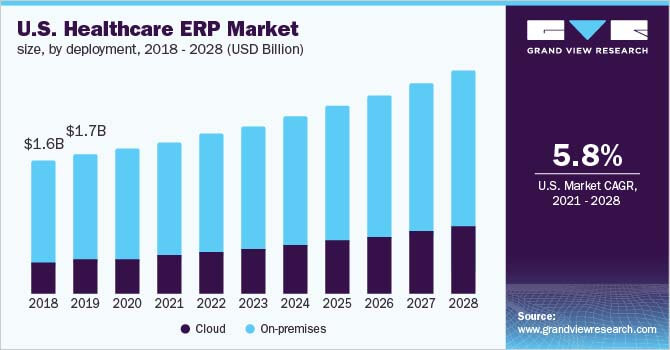- Reach Our Healthcare List Expert +1 (786) 408 5757
As the Covid-19 outbreak continued to wreak havoc on the hospital system over the last couple of years, healthcare providers required a centralized platform to deal with the severity of the crisis. This prompted them to support the digital transformation with open arms. The key advantage of digitalization is that it uses technology to design effective strategies that can support patients' demands, stimulate process innovation, offer new services, prevent interruptions, and establish solutions to preserve healthcare quality regardless of the crisis.
Table of Content -
The healthcare ERP system has achieved mainstream popularity due to its effective and robust characteristics, which can assist healthcare units in cost reduction while providing high-quality patient care. An ERP software is highly useful when it comes to leveraging new technologies to improve patient care services. The global healthcare ERP market was worth USD 6.2 billion in 2020, and it is predicted to increase at a CAGR of 6.6% between 2021 and 2028.

Source: Gandviewsearch
Enterprise resource planning (ERP) system is used in various industries, including the healthcare sector, to simplify operations and cut costs. ERP integrates data from many departments and presents it on a centralized platform using sophisticated technologies. With an ERP system, you can collect, store, and manage data across your whole facility to improve information exchange and eliminate data silos. With an ERP in place, separate departments can still use their own systems but can access data from other areas through a single application and interface. As a result, users gain a comprehensive understanding of corporate operations with minimal effort.

The healthcare industry, like any other, must deal with core services, support, and back-office operations. ERP software that includes inventory management, financial accounting, customer relationship management, human resource management, and other important modules makes these operations less stressful to manage.
The technology provides remote access to critical patient resources and information, making it easier for healthcare personnel to arrange future tests and medical procedures for informed and timely treatment decisions. ERP software has enabled hospitals and other healthcare organizations to successfully identify illnesses and give appropriate treatments and therapies to an influx of patients on a continuous basis. In fact, 40% of healthcare organizations cited better functionality as the key reason for installing an ERP system.
Integrated healthcare ERP systems are extremely valuable to the industry because healthcare organizations must deal with a vast quantity of sensitive data daily, so they must adopt sturdy and sophisticated solutions such as an ERP system to manage that load. ERP for healthcare is intended to help hospitals manage workloads and incorporate healthcare technology advancements. Here are some of the most significant advantages of ERP in healthcare services.
1. Enhances Patient Care
Clear and immediate communication between departments can improve patient care and safety while allowing for immediate treatment. Because a customized ERP system can handle administrative tasks efficiently, healthcare service providers can focus more on improving patient care.
2. Uninterrupted Processes
ERP software for healthcare is intended to offer users with timely and accurate reporting of all relevant data. Graphical visualizations and real-time information aid hospital administration in problem-solving and procedure streamlining. Healthcare businesses can save a lot of time and work once the procedure is streamlined.
3. Lowers operational costs
The ERP technology can help hospital organizations save significantly on operational costs. It can assist hospital employees in resolving workflow, resource, and productivity concerns. Cloud ERP software can help to optimize procedures and decrease waste. Healthcare organizations can cut costs by automating processes.
Medical device purchasers are typically hospitals, scientists, and other healthcare professionals. That is, they are usually clever, well-educated, and analytical. As a result, they are more likely to respond positively to quantitative reasons to buy, such as studies and data. Most medical device marketers are aware of this. As a result, they employ Evidence-Based Marketing techniques. It is a marketing strategy that is based on research, studies, and statistics. It makes sense to employ evidence because it is likely to appeal to purchasers and lend credibility to your assertions. That is why you can't state something is the "greatest surgical tool in the world." Exaggeration is not permitted.
Aside from receiving real-time insight into patient health records and exploiting the advantage of business intelligence, hospitals or healthcare service providers employ ERP solutions to gain the following advantages:
1. Supply Chain Management
Healthcare organizations, like other businesses, must successfully manage their supply chains. In other words, inventory and procurement are critical components of hospital management. Furthermore, healthcare facilities must manage lab findings, equipment, and drugs. The ERP solution can help you manage all of these issues effectively. It automates various operations and enables hospitals to provide better patient care at lower prices.
2. Better Finance Management
ERP systems can be useful for gathering and evaluating financial data in order to make more informed decisions and budgets. An integrated ERP healthcare system can help managers from many departments gain information quickly and accurately establish budgets. You may acquire a total view of the finance and accounting information by using this financial management system. It also continuously safeguards your sensitive data against fraud and security threats. Overall, the software solution aids in error-free finance management by eliminating costly administrative and inventory errors, saving time for your hospital staff in manual data entry, and lowering overhead costs in reworks due to human errors.
3. EHR (Electronic Health Records)
This is one of the most crucial characteristics of an integrated ERP system. An ERP system can be linked to an EHR to provide greater control over diagnosis and treatment. With EHR connectivity, you can also efficiently foresee the needs of patients and stakeholders. According to the Office of the National Coordinator for Health Information Technology, more than 95% of hospitals have implemented EHR (Electronic Health Record) systems. A healthcare ERP system can significantly streamline back-office operations for hospitals with integrated EHR systems. Customized healthcare ERP software can also help to streamline critical processes inside the healthcare company, benefiting both patients and physicians.
4. Reduce Operational Mistakes
The possibility of human error in tracking and processing when using manual hospital operation management is many. As a result, installing ERP software automates hospital operations and reduces errors caused by unpaid patient bills, clinical errors, cost leakages, appointment mishandling, and other operational failures. The system's ability to do numerous jobs without human interaction considerably enhances operating precision.
5. Inventory Management
This feature is intended to track inventory levels and keep essential hospital supplies in stock. With proper inventory management, you can benefit from increased visibility and reduced waste. It also enables healthcare organizations to improve patient care while lowering costs.
Implementing ERP software in the healthcare industry would alter how businesses function. Healthcare providers can become detached without it, and operations can become time-consuming and rigid. A healthcare ERP system may capture, update, share, and keep patient information on a single database. Healthcare firms can reap numerous benefits, including increased scalability and improved supply chain management. As a result, in order to provide superior patient care services and a rich experience to hospital staff, an integrated ERP System must be implemented.
Our healthcare email list includes verified contact information of healthcare professionals across various specialties and locations. Contact us today to get access to our healthcare mailing list and start reaching out to medical professionals today!